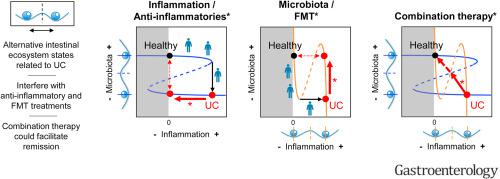Gastroenterology ( IF 29.4 ) Pub Date : 2021-09-08 , DOI: 10.1053/j.gastro.2021.08.057 Maarten van de Guchte 1 , Stanislas Mondot 1 , Joël Doré 2

|
Background & Aims
Intestinal microbiota-host interactions play a major role in health and disease. This has been documented at the microbiota level (“dysbiosis” in chronic immune-mediated diseases) and through the study of specific bacteria-host interactions but rarely at the level of intestinal ecosystem dynamics. However, understanding the behavior of this ecosystem may be key to the successful treatment of disease. We recently postulated that health and disease represent alternative stable states of the intestinal ecosystem (different configurations that can exist under identical external conditions), which would require adapted strategies in disease treatment. Here, we examine if alternative stable states indeed exist in this ecosystem and if they could affect remission from ulcerative colitis (UC).
Methods
We analyzed data from a study on pediatric UC. The data reflect current treatment practice following the recruitment of treatment-naive patients with new-onset disease. Patients received personalized anti-inflammatory treatments over a period of 1 year. Stool samples at 0, 4, 12, and 52 weeks allowed an estimation of microbiota status (through 16S ribosomal RNA gene sequencing) and host inflammatory status (through the measurement of fecal calprotectin levels).
Results
We identify 4 microbiota states and 4 host states. Longitudinal data show that the improvement of inflammatory status is accompanied by an improvement of microbiota status. However, they also provide strong indications that both improvements are retarded or blocked by alternative states barriers.
Conclusions
Our observations strongly suggest that inflammation suppression should be combined with microbiota management where possible to improve the efficacy of UC treatment.
中文翻译:

溃疡性结肠炎中肠道生态系统的动态特性需要联合治疗、靶向炎症和微生物群
背景与目标
肠道微生物群与宿主的相互作用在健康和疾病中发挥着重要作用。这已在微生物群水平(慢性免疫介导疾病中的“生态失调”)和特定细菌-宿主相互作用的研究中得到证实,但很少在肠道生态系统动力学水平上得到证实。然而,了解这个生态系统的行为可能是成功治疗疾病的关键。我们最近假设健康和疾病代表肠道生态系统的替代稳定状态(在相同的外部条件下可以存在的不同配置),这需要在疾病治疗中采取适当的策略。在这里,我们检查了该生态系统中是否确实存在替代稳定状态,以及它们是否会影响溃疡性结肠炎 (UC) 的缓解。
方法
我们分析了来自儿科 UC 研究的数据。这些数据反映了招募初治新发疾病患者后的当前治疗实践。患者接受了为期 1 年的个性化抗炎治疗。0、4、12 和 52 周的粪便样本可以估计微生物群状态(通过 16S 核糖体 RNA 基因测序)和宿主炎症状态(通过测量粪便钙卫蛋白水平)。
结果
我们确定了 4 个微生物群状态和 4 个宿主状态。纵向数据显示,炎症状态的改善伴随着微生物群状态的改善。然而,它们也提供了强有力的迹象,表明这两种改进都受到替代国家障碍的阻碍或阻碍。
结论
我们的观察强烈表明,炎症抑制应尽可能与微生物群管理相结合,以提高 UC 治疗的疗效。


























 京公网安备 11010802027423号
京公网安备 11010802027423号